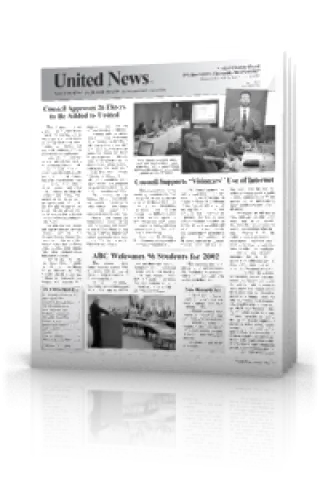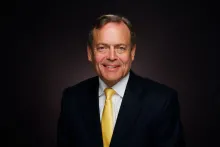Lessons From South Africa

Shooting a PBS TV special in South Africa gives a unique perspective on the challenges and potential of this surprising country.
To say that South Africa is a surprise to an American minister is an understatement. From picture books and history, I knew that South Africa is a country as spectacular as its fabled DeBeers' diamond mines which have dominated the world's gem markets for the last 150 years. I also knew that God had done a work there among people who live in a society both dramatically different and strikingly similar to America.
Difficult to Summarize
It's not easy to write a short summary of lessons. I learned much in the two-week trip to South Africa with a delegation of 35 community leaders from Indiana. From Oct. 27 to Nov. 9, 2001, my job was to be on assignment for WFYI, the PBS television station in Indianapolis, and for our UCG home office. I was to capture television footage of South Africa and the activities of the group of leaders to be used in a PBS special with credits to the United Church of God. The footage will also be available for our future television needs.
The delegates were Hoosiers, the name people from Indiana call themselves. It's an affectionate term which they all enjoy, but nobody knows why or where the name came from.
They were fun loving. They were also very serious. They were intense. I learned early that staying ahead of the delegation to capture their activities and the essence of South Africa was an 18-hour-a-day job.
I completely appreciated the two Sabbaths spent in Johannesburg and Cape Town and the opportunity to speak to our energetic congregations there, pastored by André van Belkum and Peter Hawkins respectively. Our brethren there shine just like the diamonds of South Africa. The delegation, including WFYI's president and Indiana first lady Judy O'Bannon, knew that "Howard, the TV producer from Portland," didn't work Saturday because it is the Sabbath. With enough rest, I was able to capture 28 hours of footage with the help of Lloyd Wright, WFYI's president who asked to be my assistant, an offer I couldn't refuse.
The group was a People to People Ambassador Program delegation. This exchange program for community leaders was initiated under the Eisenhower administration to promote understanding between Americans and the rest of the world. Our particular delegation was organized around the theme of community building. Mrs. O'Bannon, the wife of the governor of Indiana, is an outstanding public servant in her own right, a fact made obvious as she led the delegation.
Courage in Shadow of War
Though the trip was planned in the summer, the delegation members were deeply concerned about the potential threats on Americans abroad after Sept. 11. Many didn't want to come, but when Mrs. O'Bannon let many know she believed it was important to not let the negative events overwhelm the very important mission, they all took heart. Some told me that they felt their lives were in God's hands.
The itinerary took us through New York City for a Saturday night departure on Oct. 27 and a return on Nov. 9.
Kennedy airport was deathly slow. Half the restaurants in the food court were shuttered due to the collapse of business after the New York disaster. Throughout the trip, events in the Middle East, New York and the anthrax scare dominated the news in South Africa as we traveled under the shadow of the war on terrorism.
For many delegates, it took courage to travel to South Africa at that time. But once there, the delegates said they would never regret it, come what may.
We flew via South African Airlines to Johannesburg, South Africa's industrial and financial capital. While there, we met with top government officials regarding all aspects of national development. We met student leaders at the University of Pretoria 30 miles north and celebrated the opening of a joint art exhibition at the Johannesburg Art Museum and the Indianapolis Art Museum officiated by Mrs. O'Bannon. We toured Kruger Park on the border with Mozambique. We flew to Cape Town at the tip of Africa where the Indian and Atlantic Oceans meet. Then for two days we visited Victoria Falls, Zimbabwe, one of the seven natural wonders of the world.
Service-Minded Leaders Build Communities
Perhaps the greatest lessons I saw in action among this high-powered group of leaders from many different fields, disciplines and institutions was the theme constantly emphasized by Mrs. O'Bannon. It is one of the greatest principles Jesus taught and one of the foundations of the success of the United Church of God.
Service is the basis of all leadership resulting in true community building. Mrs. O'Bannon stressed constantly that communities that overcome problems—communities that work and make progress—are those with leaders who know how to motivate and inspire their communities through their service.
As Americans, it's easy to look down on other peoples and cultures and their problems. But it's more challenging to understand the difficulties, desires, histories and goals of real communities. To serve effectively, you must be ready to learn, to listen, to appreciate. South Africa's problems are not wholly unlike those in America, only in different degrees and settings. Some problems are desperately difficult, however, and can only be solved by the character and determination of South Africans.
Take AIDS, for example. It is estimated between 12 and 35 percent of the black population is HIV positive. The death toll in the next 10 years will be staggering, perhaps 8 million men, women and, tragically, children. It is like knowing that an atomic bomb is coming. We were able to interview important authorities on the topic, as well as tape outstanding professional presentations.
With the post-apartheid challenge of creating an equitable multiracial future for its 43 million citizens, South Africa's task in community building is perhaps a greater challenge than America's. But its black majority of 30 million, along with minorities of whites, colored and Indian peoples, wish to succeed as much as Americans.
We met many outstanding leaders. We toured landscapes as vast and beautiful as America's. Most important, we saw, met and appreciated its many peoples in the rich-, poor- and middle-class settings that make up contemporary South Africa.
South Africa needs outstanding leaders, and is developing many. But it needs more. Its number one employment field is education. Many of its people highly regard the role of the United States in the world and its leadership position. But they know they must solve their problems and that America is now experiencing some of the terror they have known for a generation. LifeNets and the Ministry Help
Mrs. O'Bannon on three formal occasions talked about the outstanding global reach of the services of Indianapolis-based LifeNets and the associates of Victor Kubik, the UCG Council member who is LifeNets president. Through Mr. Kubik, the WFYI president invited me to help the delegation. Mr. van Belkum and Johannesburg member Steve Serfontein helped me immensely by providing important side trips to capture the essence of South Africa in the Johannesburg and Pretoria region. We traveled the wonderfully beautiful and lush rolling hills of farmland 300 miles east to Kruger National Park, a wilderness preserve teeming with lions, giraffes, baboons, elephants, tigers, hyenas, rhinos and hippos.
Peter Hawkins provided the same outstanding service in the Cape Town area. Mrs. O'Bannon noticed and commented on the help UCG members provided to the delegation, inviting them to the official banquets, hugging them good-bye and thanking them for their service.
One lesson I saw is the power of real Christianity and service in every situation. Just watching the outstanding service of UCG ministers André van Belkum and Peter Hawkins, deacon Jorge de Campos and member Steve Serfontein as we helped Mrs. O'Bannon was a learning experience.
Elephant-Size Problems, Lion-Like Destiny
Like the Garden of Eden, South Africa has much good. It also has much evil.
Crime is so serious that in most areas property is surrounded by barbed-wire fences and walls that make them virtual fortresses. Tribalism does not threaten civil war, but it does hold a power over many millions, conditioning men to be routinely violent and oppressive to women. Witch doctors tell men the way to avoid HIV or be cured is to have sex with virgins, and the rate of indiscriminate rape of young girls is an outrage, spreading HIV while scarring their lives forever.
Underemployment is endemic. Only 40 to 50 percent of blacks are employed.
Yet the opulence of the rich and middle class and the modernity in Johannesburg, Pretoria, Cape Town, Durban and smaller cities is no different in type or degree than found in any of America's great cities. I saw shopping malls that were more palatial and superior to the suburban malls in Seattle, Washington, or Portland, Oregon.
It's difficult to sum up the impact of this land, so rich and poor, spectacularly beautiful and full of promising progress and ongoing tragedy. South Africa today is a place of amazing contradictions.
But it is obvious South Africa is also a place where God continues to fulfill His promises to Abraham. It is a place that desperately needs the grace of Christ, the truth of God and the administration of the government of God. He obviously wants His work of proclaiming His truth to grow.
I was impressed with the importance of the small but growing United Church of God in South Africa as it struggles to keep up with the opportunities. It must never feel it is alone. South Africa, and our congregations there, need our prayers, our support and our love, for surely this country will be one of the earth's greatest jewels for a thousand years!



